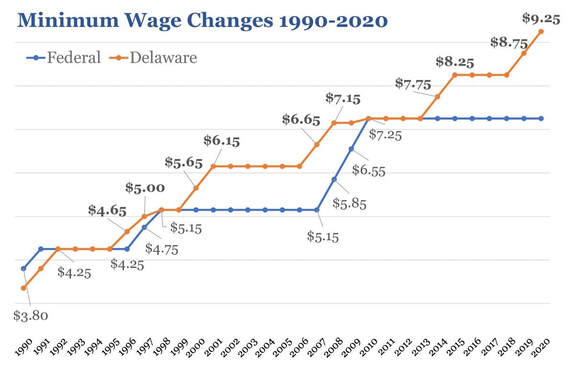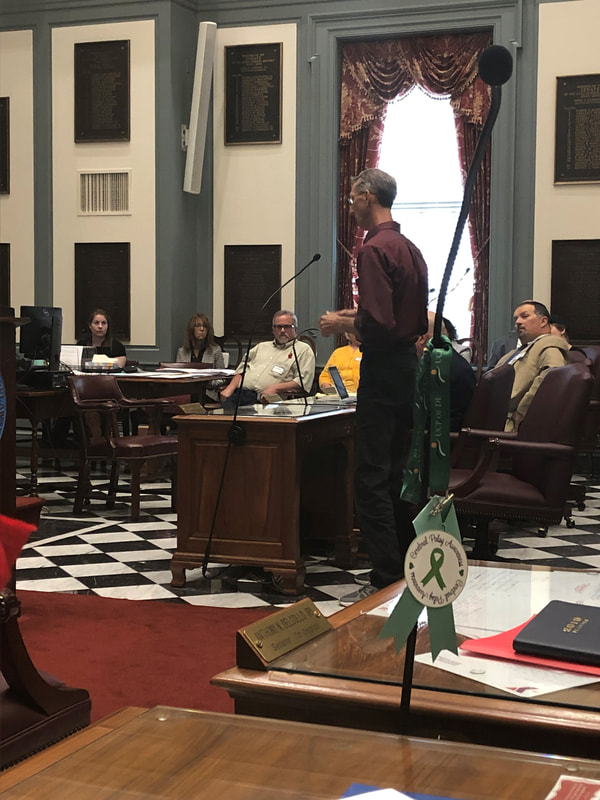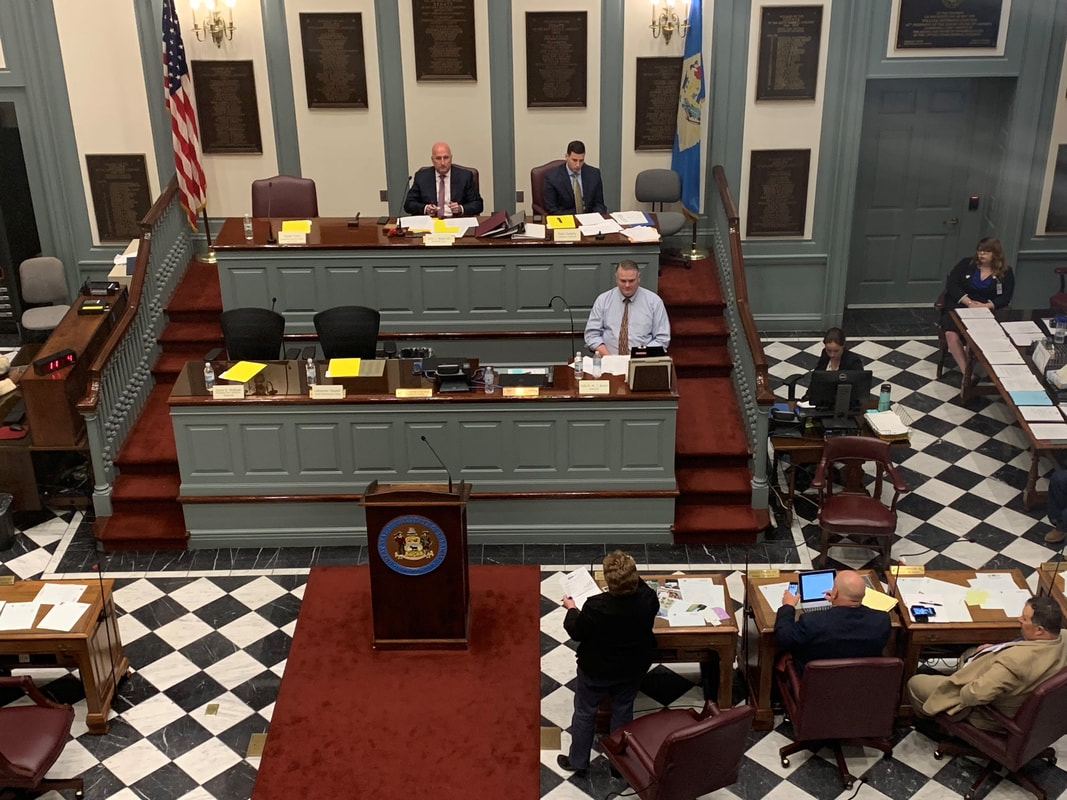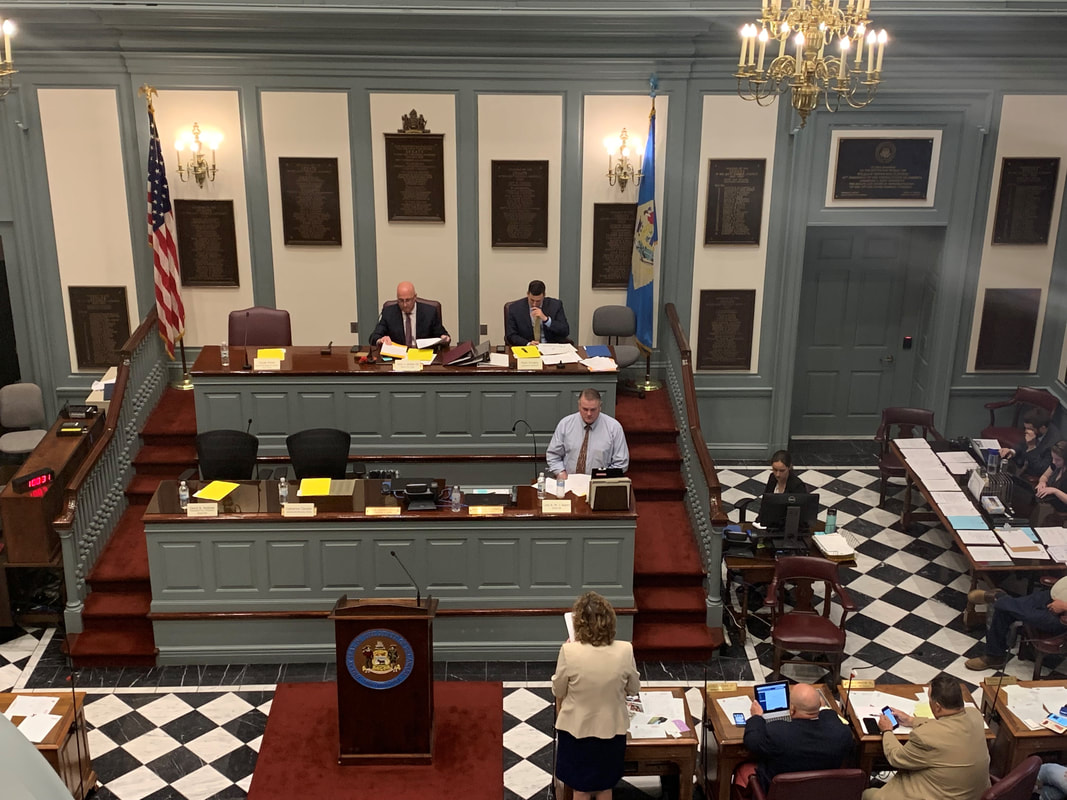|
By James DeChene, Armitage DeChene & Associates This week the Delaware Senate passed SB15, which increases Delaware’s minimum wage starting in 2022. As previously reported, the increases are as follows:
The bill now goes to the House to be assigned to committee. More to come on that. The updated version of HB150, a bill that would legalize marijuana was introduced this week. We will be reviewing the bill for any changes from prior versions and update you. In the meantime, if you have not yet registered for next week’s Manufacturing & Policy Conference, a reminder that there will be a marijuana roundtable to explore the impacts on employers. We also expect to hold another in-depth seminar on the issue soon. More info to come. Also this week, the Delaware Economic and Financial Advisory Council (DEFAC) met and revised upwards revenues for FY2021 and FY2022 for a total of $322 million. The revision is largely due to strong performance in Personal Income Tax (PIT), Corporate Income Tax (CIT), and the Franchise Tax. In fact, year over year incorporation numbers rose from 12,000 to 15,000 new entities formed. The gains in PIT should largely negate argument this year on HB64, which would create new PIT levels for high earners. Lastly, with the passage of the American Rescue Plan, Delaware should see another $1.4 billion to help with coronavirus relief efforts. Cities and towns are also expected to receive significant monies that can be allocated towards lost revenues along with water, sewer and broadband improvement projects.
0 Comments
This week the General Assembly returned from budget break. Of note was the introduction of SB15, legislation to increase Delaware’s minimum wage. If passed, starting in 2022 the minimum wage would be $10.50, $11.75 in 2023, 13.25 in 2024, and reach $15.00 in 2025.
A few months ago the Chamber sent a survey to members asking the impact these wages would have on their businesses. If you have current feedback based on these numbers and timing, please let Tyler Micik know. In addition you can provide public comment at next week’s Senate Labor Committee (time TBD) to let legislators know how SB15 will impact you and your employees. The State Chamber’s Environmental Committee also received a win this week. The committee recently came to an agreement with DNREC regarding their proposed changes to the Brownfields Development Agreement (BDA). The DE Brownfields statute was enacted in the early 1990s to promote the redevelopment of historically contaminated and abandoned sites, and by all accounts the program has been a success. The State Chamber advocated against revisions in the language of the agreement that would impose greater liability on brownfields developers than the original statute, potentially deterring the development of abandoned sites. The State Chamber’s recommendations were taken into consideration and the problematic revisions were dropped. This is good news for brownfields developers because it continues the liability protections contemplated by the original Brownfields legislation. By James DeChene, Armitage DeChene & Associates
The General Assembly gaveled out of session early on July 1, 2020 in what was the earliest ending in recent memory due to what has been an almost indescribable year to date. With little to no drama on the money bills (Budget, Grants in Aid, and Bond) as they were passed on June 29th, the General Assembly was left to close out a few bills on consent agendas. The Senate said goodbye to retiring Senator Harris McDowell, and the House bid farewell to retiring Representative Quinn Johnson. This means that for next session there will be two new co-chairs for the Joint Finance Committee and both the Senate and House Energy Committees will have new chairs as well. As the General Assembly came back to session in January, members seemed poised to pass a series of legislation that included increasing Delaware’s minimum wage, expanding worker’s rights, and increasing the role and presence of private and public employee unions. Those bills largely went nowhere, and with the COVID-19 pandemic altering how the legislature would work, those bills were placed on hold until next year. The same can be said for legislation the business community supported as well. Efforts to invest in clean water infrastructure, building a new high school in the City of Wilmington, modifying the state’s offerings of Association Health Plans and creating new workforce training platforms (more on that later) all took a pause as well. That said, a number of bills important to the business community were introduced, and some were acted on in the final weeks of this session. They included:
In the midst of three months of uncertainty, countless Zoom meetings with Governor Carney, members and staff from his Administration, the chambers of commerce community, stakeholder groups and others, there were a number of positives that were announced, and work completed ahead of schedule. The State Chamber has long been an advocate for rural broadband development and adoption. Last year’s announcement of BlooSurf, a project to bring broadband to western Sussex and Kent counties was met with fierce approval. Originally slated to be completed in 18-24 months, the project was able to be completed in just over 12 by using federal CARES Act funds to speed up the building process. In July 2020, 15 towers are set to be completed. Efforts to promote residential adoption of broadband will roll out soon after in preparation for what could be another school year of distance learning. Now children in these communities will be able to be active participants. Similar broadband adoption efforts are taking place in Wilmington with the similar goal of making sure all children have access to distance learning efforts. For the last year, the State Chamber has pushed for the creation of a workforce training program similar to what has worked with ZipCode Wilmington. A compressed, 40-hour week training schedule focusing on in-demand career paths that will help transition low-skill workers into better paying jobs. While the legislation creating this program was not worked on this year, we continue to work with Governor Carney and his Administration on creative ways to implement such a program, especially in light of the potential permanent job losses related to COVID-19. WHAT'S NEXT? Between now and January 2021, when the 151st General Assembly convenes, much will have happened:
There remains a great deal of uncertainty as we enter the second half of 2020. What does remain certain, however, is the Delaware State Chamber of Commerce’s dedication to advocacy on behalf of its members – the business community. Look for more opportunities in the coming months to hear from experts on the latest trends as the COVID-19 pandemic, and recovery, continue to evolve. Also look for innovative networking opportunities and other creative ways to get your business noticed. For more information, check www.DSCC.com. A recent article in SFGate focused on how Maine’s aging population is putting a strain on the healthcare industry—from retirement homes to home health aides, there aren’t enough people to staff these jobs forcing closures and cuts to services, even if they are state mandated.
Maine now classifies as “super aged” meaning over one-fifth of its population is over the age of 65. By 2026, 15 other states, including Delaware, are expected to follow suit. Let that sink in. While Delaware touts itself as a retirement destination, and it certainly is (Hello, Sussex County) the flip side is the strain placed on care workers as more and more individuals require assistance and care. The cost to provide these services isn’t expected to decline any time soon, and as last year’s minimum wage debate highlighted, the cost to the state to increase reimbursements for direct support professionals ranges into the millions per year. Delaware should be following closely the situation in Maine and the other 13 states, as we collectively advance to “super aged” status. We need to be looking at creative ways to lower costs for businesses so they can apply those savings to the inevitable cost of labor increases. For example, Maine allows businesses to pool together to purchase insurance under associated health plans, an idea the State Chamber and others has begun to flesh out. It will take creative and innovative thinking to help solve these and other problems facing Delaware, and it will take the cooperative efforts of the general assembly, business, health care and other communities coming together to be successful. by James DeChene
Last week had, and in the upcoming magazine will have, a write up on the end of session that wrapped up early July 1st. Not captured, however, were some of the more esoteric moments that helped make up the last six months that I’ve found interesting now that summer has officially begun and your friendly neighborhood government affairs professional has time to think. Headed into January with over 20% new faces was both exciting, thrilling, nerve-wracking and (at least for me) a career first to work with so many new members. It’s been interesting watching them learn the ways of the building, finding out what issues they are passionate about, and how the State Chamber and our members fit in. The answer to the last point is a positive one from my perspective. Each of the freshman legislators I had the opportunity to work with were open to hearing how legislation would impact the business community, and while we may not have agreed after each conversation, it’s important to continue to build the dialogue and relationship going forward. I was also impressed with the “temperature” of the building. It’s no secret the last few years ended in with tempers flaring as the time grew later and later into July 1st, and even beyond. This year (with hopes that next year will be similar) each Chamber was efficient in finishing up what they needed to do, and it was one of the earliest, and least contentious, endings to a session in recent memory. Let’s keep that particular streak going. As I think back to the work that was accomplished in the last six months, I’m grateful for the partnerships that helped make it possible. The Association of Chambers has been the most active it’s been in years with almost every chamber of commerce actively participating. The State Chamber membership stepped up to help provide background, talking points, suggestions, communications and alternatives on key pieces of legislation this year. That streak will definitely need to keep going. You’ll hear more from us in the coming months on priorities we’re pursuing, including cheaper health care options for businesses, innovative ideas on workforce development and training opportunities, as well as asks for help to keep up the pressure on the “old standbys” in minimum wage and marijuana legalization legislation. You’ll also be asked to provide your feedback on these and other issues as we shape our 2020 agenda. Until then, I hope you enjoy this bit of summer and that your AC continues to work. Earlier this morning the General Assembly finished their work for the first leg of this legislative session. Items of note included a budget that set aside close to $125 million in reserves for future years, the largest bond bill in Delaware history, and a grant-in-aid bill with more money allocated than in recent years.
Of specific note for the business community are the bills that did not find their way to passage, although many will return in January. They include a minimum wage increase, a tipped worker minimum wage increase, and the legalization of recreational marijuana. The Chamber continues work on a number of items into next year, including finding creative ways to lower health care premiums for small and medium sized businesses, investments in workforce development and training opportunities for unemployed and underemployed workers, and finding innovative ways to attract and retain high level talent for employers looking to expand and relocate here in Delaware. The State Chamber thanks you for your engagement this legislative session and we look forward to working with you next year in making sure Delaware is the best place to live, work and do business. by James DeChene This week, the last of this session saw a few bills of importance to the business community being either introduced or worked. One is SB 71, a bill that would mandate that all future pharmacies run in Delaware be owned and operated by a pharmacist or an entity comprised of a majority of pharmacists. This would have serious impacts on the pharmacy, developer and construction industries in Delaware, as chain pharmacies, grocery stores and stores like Walmart and Target would no longer be able to run their pharmacies themselves, and would instead have to lease out space to pharmacists/pharmacist groups if they wanted one in their store. This would have a chilling effect on future development and expansion of these entities in Delaware, including potentially putting the kibosh on the proposed Wegmans in Barley Mill. The State Chamber and others have asked for the bill to be delayed until next year so that we can work toward a compromise. More to come. Two bills involving tipped workers and minimum wage were introduced this week. One would raise the tipped worker minimum wage to 65% of the current minimum wage, and the other would govern how tips are reported and paid out by an employer. The State Chamber is currently reviewing these bills with industry organizations and representatives to judge their impact. The Senate passed the Bond bill late Thursday night, totalling $816MM for FY19 and $862.9MM for FY20, where it now faces a vote in the House. The General Assembly will meet on Sunday and into Monday as they finalize the last minute spending bills (bond and grant in aid) and work to get their last minute must-haves passed. Look for an update Monday on the big ticket items accomplished. by James DeChene
This week in Dover saw the General Assembly continuing their work prior to the June 30th recess. Items of note included confirmation that the minimum wage bill will not be worked on again until January, and the same for the legalization of marijuana. The State Chamber will continue to advocate on behalf of the business community educating members of the General Assembly of the pitfalls of these bills, and will be looking to our members to help share their stories. The House passed the budget bill this week, along with an approximate $61 million one-time spending bill to be administered by the Office of Management and Budget. Once bond and grants in aid bills are finalized, that will dictate how much will be used in the set aside for reserves (a reminder that the State Chamber has called for $125 million to be set aside). A bill that would allow school districts to provide students with bus passes, allowing them to get to school and potentially to after school jobs, passed the Senate where it now heads to the House. A bill that would increase the penalties for failure to file their proof of unemployment insurance each quarter from $17.25 to a minimum of $100 with a cap of $450. Next week is the final week of session, ending June 30/July 1. Items to be considered, along with finalizing the budget, will be bond bill, grants in aid, and perhaps the workplace fraud act legislation that the Chamber and others have been working on for about a year now. More to come. by James DeChene This week in Dover the major bill impacting the business community was SB105, which will raise Delaware’s minimum wage to $15. We started off the week hosting a teletown hall with over 50 members joining to hear the latest on timing and strategies, and a number of businesses joined us in Dover to make comment on the bill at the Senate Labor Committee. The stories business leaders shared during the committee meeting were compelling and varied, and included entities ranging from nonprofits to small and medium sized businesses from bakeries to a small business sign maker. Ultimately the bill was released from committee and has now been assigned to Senate Finance Committee due the bill’s significant fiscal note. If you have not taken the opportunity to contact your senator on this bill, I urge you to do so by visiting our Action Network page. Other bills of note: The passage of a Chamber-backed bill in SB61, which would create a Transportation Infrastructure Investment Fund (TIFF) to help expedite commercial and industrial development projects. Released out of committee was SB74. This bill would make a technical change to the New Economy Jobs credit making it easier and more likely businesses will be able to take advantage of the credit. Moving forward, there are 7(!) legislative days left this session. DEFAC will meet next Wednesday to announce the final forecast numbers that will dictate how much money will be allocated to the bond and grant-in-aid bills. members testifying against sb105 on june 12:
by James DeChene
This week was the first in the four-week sprint to June 30. Highlights this week included: HB110, the legalization of marijuana bill was released out of House Revenue and Finance committee. DSCC remains opposed to the bill for reasons such as restrictions in how employers can create employment policies surrounding marijuana use, the current difficulty for employers finding qualified applicants that can pass a drug screen (which we think will be exacerbated by legalization) and the lack of a spot test for impairment. SB105, the bill that would raise Delaware’s minimum wage to $11 in January 2020 and then by a dollar each year until it hits $15 in 2024 (with an imbedded escalator to raise with cost of living), was tabled in committee this week, HOWEVER, it will be heard in Senate Labor Committee next Wednesday, June 12. This will be one of the Key Votes (along with HB110) that DSCC will be using when making the decision on whether to support candidates. Also this week was the State Chamber’s End-of-Session Brunch. Attendees heard from Tim Holly, chair of the DSCC Employer Advocacy Committee, on HB110, from Gary Stockbridge, DSCC Chairman, Chair of the Delaware Workforce Development Board (DWDB) and President of Delmarva Power, on what the DWDB is up to and how members can help in workforce training. We then heard from Solomon Adote from the Delaware Department on Technology & Information on the Cyber Security Council and the work they are doing to develop best practices on how to combat cybersecurity threats. Rounding out the morning were remarks from House Speaker Pete Schwartzkopf on what to expect in June, including legislation on clean water, medical and recreational marijuana, education investments and how the state budget is shaping up. Senate President David McBride offered his perspective including acknowledging efforts by the General Assembly and the State Chamber to help provide economic development opportunities in Delaware. He also discussed what the Senate will be working on, including minimum wage in committee, education and transportation infrastructure investment |
Archives
July 2024
Categories
All
|
|
Copyright Delaware State Chamber of Commerce, Inc.
All Rights Reserved. PO Box 671 | Wilmington DE 19899 (302) 655-7221 | [email protected] | sitemap |
|





 RSS Feed
RSS Feed